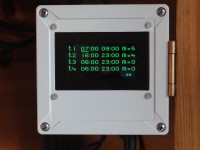Timer

Remember this one (p1)?
Remember this one (p1)?
An old fashioned, mechanical timer. With its little tumblers, you can set a period of time during which the mechanical timer supplies 230V at its terminal. These timers are often used to automatically turn on a light in the evening when someone is on holiday, in order to give the house an occupied look. However, most units are limited in their options: the minimum length of a time period is usually at least 15 or 30 minutes, the clock is mechanical and not very accurate and there is only one relay.
My neighbour had a bunch these contraptions to power to his electrical devices in his garden and aquariums, but they are finicky to setup and their timings tends to drift.
Electronics to the rescue.
Let’s make a timer that is capable of controlling 8 or 16 relays for any period between 1 minute and 23 hours, 59 minutes. A built-in GPS unit will keep accurate date and time. This eliminates having to synchronise the timer when it has drifted and it allows us to configure weekends and holidays separately. Finally, by connecting a photocell, it becomes possible to switch a relay based on the amount of ambient light.
There are currently 2 configurations available. An 8-channel ‘stand-alone’ version: The 8 relays can be programmed with a rotary encoder present on the unit (p2). An OLED displays the configuration (p3). Programming is simple, but a little time consuming (p4).
A 16-channel version: This version is more elaborate. Programming the 16 relays can be done via an application on a PC/laptop and the configuration can be sent to the unit via USB (p5). Next, the unit will automatically follow the new configuration. This version has 16 LEDS which display, for each of the relays, whether it is on or off and a LED display showing the current time.
Both versions have some minor kinks that need to be ironed out and proper documentation remains to be written. I will be more than happy to do both, but first I would like to gauge if there is any interest.



Discussion (1 commentaire(s))